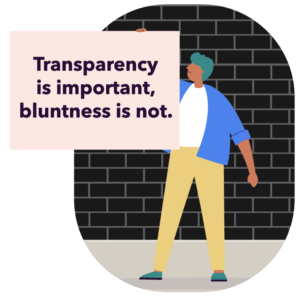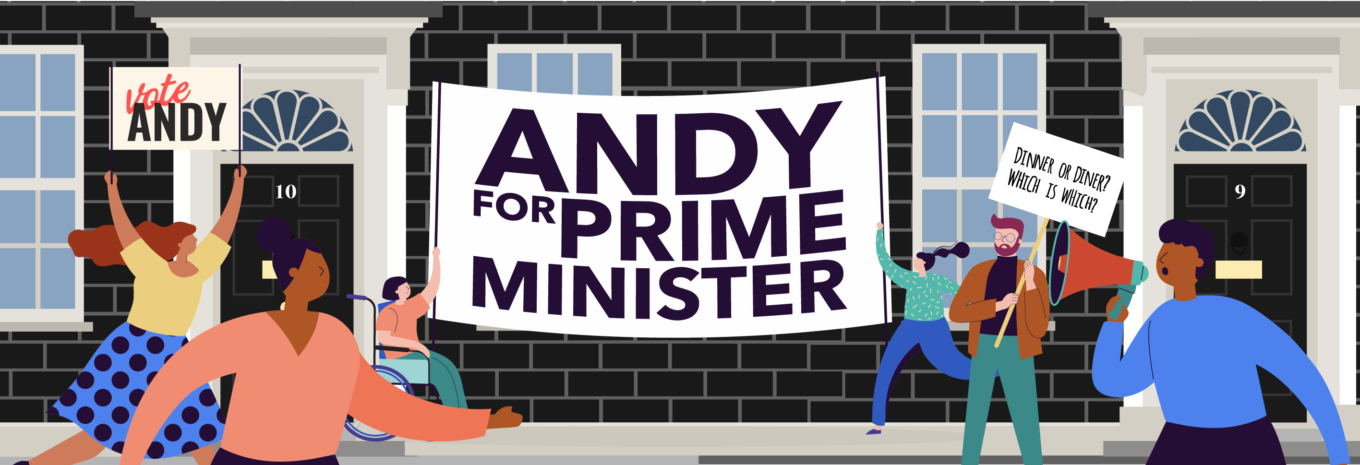“It’s like asking a chicken to fly when it can’t.”
There’s a running joke in the Alive office that one of our designers Andy should run for Prime Minister. His perspective and unique take on situations is refreshing, if also sometimes a bit surreal.
But of course, there’s a difference between speaking your mind with people you trust and speaking to the nation where every word is scrutinised and analysed. It’s never been more important for leaders to choose their words carefully to ensure their intent is what is conveyed. Clarity and honesty are key.
The same can be said for business leaders. Who can forget KPMG’s UK Chair Bill Michael who told employees on a virtual meeting to “stop moaning”? Hardly a leader you want to work for.
So, as we await news of who our next Prime Minister will be, we thought we’d take a closer look at what attributes you need to be a good leader (political or business) and share some of Andy’s most famous quotes along the way.
 Be honest
Be honest
“I did go on the kerb once, I was distracted by a large dog.”
We don’t need our leaders to be perfect, we need them to be honest. Hearing about mistakes humanises them and helps employees to trust what they’re sharing.
However, honesty doesn’t have to mean rude. Difficult messages can still be delivered in the right way with the help of internal communicators. We have a role to support our leaders in understanding the impact their words will have and that while transparency is important, bluntness is not.
Be curious
“I wonder why a duck’s noise is a Quack?”
Leaders can often fall into the trap of thinking they know it all. But to innovate and move forward, we need to constantly ask questions and feed our curiosity.
Start up companies are disrupting industries that have been around for years and years. They’re usually headed by a leader who asks questions and chooses to not see limitations but challenges to be overcome.
They’re also open to others in the organisation to ask questions and innovate. The world is moving at a fast pace and leaders that accept the status quo will find themselves, and their companies, left behind.
Work with your people team to encourage leaders to embrace two-way communication and to listen to the ideas of employees. Changing to this type of culture won’t happen overnight but it will pay dividends in the long run.
Relatability
“Don’t you hate it when you find out your socks are too long.”
Sometimes it feels like the gap between our politicians and the public, or leaders and employees, just gets bigger and bigger. It’s essential that leaders can find common ground, something that everyone can relate to.
Anecdotes can be a great way for them to share what makes them ‘normal’. The lockdowns provided a great opportunity for this; suddenly leaders were also juggling work with home-schooling or had the cat walking over the keyboard during a meeting. For the first time, they seemed human, and employees want to see more of that.
Help leaders to understand what makes them relatable and encourage them to weave it into their communications.
Be profound
“Because life doesn’t have to be relevant.”
Sometimes we want to be inspired by our leaders, for them to leave us with something to ponder rather than our head in our hands with despair.
While profound quotes might not be your leader’s thing, they can inspire by using storytelling. It brings information to life and helps it become memorable. There is an art to storytelling, so work with your leaders to understand what stories they have to tell and how they can share them in an engaging and aspirational way.
Be bold
“The biggest risk I’ve taken is not having salad cream on cucumber.”
Playing it too safe can cause stagnation. Sometimes you just need to take a calculated risk. The job of the internal communicator is to understand their audiences and to be able to articulate the rationale behind changes being made by leadership in a way that’s relevant and easy to understand.
This means having a strong relationship with leaders where you can ask probing questions and challenge them on their answers. If they can’t articulate the ‘why’ of their decision making, it’s unlikely employees will want to get on board.
Own your limitations
“Dinner or Diner – I still don’t know which is which.”
We can’t be good at everything. That’s why a good leader needs to have a great team around them with the skills and expertise they might lack. And to be an excellent leader they need to listen to the advice and guidance and not assume they know better.
For internal comms, we often feel as if everyone thinks they can do our job better than us. We need to ensure that leadership see us as experts and rely on us for communication advice. Spend time really understanding the business you work in as well as what’s keeping your leadership awake at night. Being able to position conversations about comms around things that really matter to them will go a long way.
Confidence
“I’ve got a really strong reflection.”
We want to know that our leaders are sure about the way forward (although we don’t want them to be unapproachable or seem ‘untouchable’ due to misplaced hubris!).
When supporting leadership with their communications, use statements such as “We will” or “We know” rather than hedging words such as maybe, seem, appears, or usually.
It’s also important to encourage them to avoid jargon – while it may make them feel knowledgeable, no one else will have a clue what they’re saying!
Community
“Jesus had his followers – I’ve got you lot.”
The importance of having a great team around you who speak truth to power can’t be underestimated. Ensure that leadership see internal comms as integral to the business and counts on you as strategic advisors.
This means having a clear IC strategy that aligns with the organisational strategy. It means being able to evidence your advice through meaningful measurement. And of course, it means speaking truth to power.
While Andy remains reluctant to run for Prime Minister, we do think his pearls of wisdom provide food for thought when it comes to leadership communications. And who knows, maybe one day he will make the move to Downing Street and finally tell us the answer to why a duck quacks.
Helen Deverell for Alive!
















